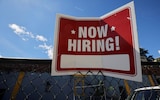Germany faces years of near-stagnation as baby boomers retire and it battles a shrinking workforce, the International Monetary Fund (IMF) has warned.
The world’s lender of last resort said Europe’s largest economy will be doomed to lacklustre growth unless it finds a way to keep people in work.
The growth rate of Germany’s working age population will fall by 0.7 percentage points “in the medium term” owing to the large generation of boomers retiring and fading immigration, the IMF said.
This will leave the manufacturing powerhouse with the largest fall in its workforce growth rate of any G7 country, and at half the rate previously estimated.
Carsten Brzeski, an economist at ING, said the bleak figures marked the start of “the Japanification of Germany”.
Mr Brzeski said: “Before the pandemic, potential growth in Germany was estimated at around 1.5pc. So this shows you the big impacts demographics are having.”
The IMF said that public finances would suffer from having a much older population, with tax receipts growing at a slower pace and spending on healthcare and pensions rising.
Mr Brzeski added: “Except for Japan, we simply don’t have any other example of any developed economy of what this demographic change will do. We look at the headline numbers, we see growth coming down [and] stagnation, but we have no clue what this will mean for societies.”
A record 1.4 million Germans will celebrate their 60th birthday this year, Mr Brzeski said.
Meanwhile, five to seven million workers will exit the labour force over the next five to 10 years, he added.
Mr Brzeski said: “This is enormous in an economy that has a pay as you go pension system. The working population is paying the pensions of the retired. Will it put the debt brake to a test? Yes, it will.”
Germany’s restrictive fiscal rule asserts it can at most borrow 0.35pc of GDP a year. In particularly challenging times this figure can be higher, but the government is bound to pay it quickly as soon as the economic conditions improve.
The IMF warned that Germany faces numerous spending pressures in the medium term in addition to the costs from an older population.
The country will likely also need to keep ramping up defence spending amid the ongoing threat from Russia, the lender noted.
While Germany has increased public investment in recent years, there is still significant cash required to upgrade infrastructure for transport, energy and communications, it added.
The IMF said Berlin should consider loosening the debt brake to cope with such pressures.
It also warned that in the absence of immigration, it needs other policies to boost labour force participation.
There are two million fewer women than men in the workforce, and they are four times more likely than men to be in part-time employment.
To boost their participation rate, the IMF urged Germany’s chancellor Olaf Scholz to expand access to full-day child and elder-care and review punitive marginal tax rates for some low-income workers.
Germany has experienced large waves of immigration in recent decades, but public opinion polls increasingly show a rise in concern and negative sentiment toward it.
The hard-Right party Alternative for Germany (AfD) surged in popularity last year amid discontent with Scholz’s government.
While it has been marred by scandals, the populist anti-immigration party has risen 10 percentage points in local elections.
Mr Brzeski warned that politicians both in Germany and elsewhere were storing up problems for the future by failing to adapt for an ageing population.
He said: “Some five to 10 years from now people will look back and say ‘well, gosh, 2024 should really have been the moment when they altered the fiscal rules to have more spending, more redistribution and more transfers’.
“But in the political debate, such as in the UK and other countries, hardly any politicians so far think he or she will be elected by telling the electorate that they will have to work longer, or that they will have to cut their pensions.”
Disclaimer: The copyright of this article belongs to the original author. Reposting this article is solely for the purpose of information dissemination and does not constitute any investment advice. If there is any infringement, please contact us immediately. We will make corrections or deletions as necessary. Thank you.



